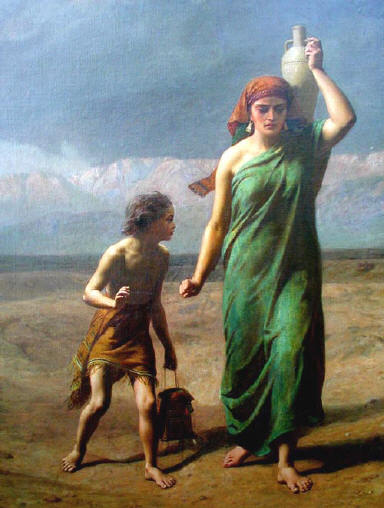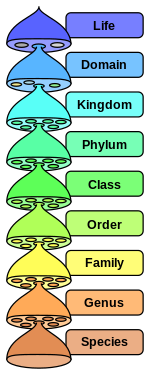Genesis 21: 8-21; Matthew 10: 34-39
New Ark United Church of Christ, Newark, DE
June 22, 2014
 |
| Hagar and Ishmael in the wilderness |
I can’t begin to explain or understand the sectarian violence that is occurring in Iraq right now. I do know that conflicts between Iraqi Sunnis, Shi’ites, and Kurds have been ongoing for quite some time, and that the U.S. military presence for the last 10 years did not help to resolve any of it. Though this present conflict is not thought to be an echo of any ancient rivalries, and though Israel is not involved but certainly watching, in this conflict we can still hear the story of Isaac and Ishmael.
Whenever there are riches, goods, and power to be had, it seems we human beings can be sure to at least argue and likely fight for them, sometimes viciously. Let us not forget that Ishmael came into this world because of rape. Just because Sarah gave her slave to Abraham so that she might conceive a son through Hagar does not mean Hagar went willingly. Out of fear that she would not conceive, Sarah tried to force God’s hand. Then, having succeeded, and with Abraham washing his hands of it, Sarah threw Hagar out of the house, because Hagar ‘held her in contempt’—a nice way of saying “I could kill you”. But God brings Hagar back, promising to take care of her and the baby she is carrying.
A few years later, seeing her son Isaac playing with his older brother Ishmael, Sarah again is fearful. What was promised by God, a nation of descendants, and closer to home—Abraham’s legacy—would have to be shared between the two sons. A whole pie is more desirable than having to divide one, so again, Sarah throws Hagar and now also Ishmael out of the house. At least this time, Abraham is distressed about this, because of his son.
Yet God allows all of this behavior to play out. God does not try to get this disjointed family to live together. God does not condemn any of them. Rather, God deals with them separately, individually, as a parent would discipline siblings. Though this family is divided against itself, God’s care of them is not. In our eyes it would appear that God’s loves are conflicting, but with God it is all one love.

An Israeli soldier and a Palestinian man.
In the reading from Matthew’s gospel it would appear that Jesus wants his followers to divide themselves against their families. Yet from a Middle Eastern or Semitic perspective, a result was viewed as the purpose as well. The division of families was indeed a reality, a result of the Jesus movement within Judaism. The religion of the head of the household dictated the religion of the whole house: spouse, children, servants—everyone. If anyone chose to follow Jesus and to break with this tradition it caused great strife in the household. The thinking was: if families are divided then this must have been Jesus’ purpose.
Some may have thought that division was the purpose of the United Church of Christ when the delegates at the Central Atlantic Conference meeting last weekend voted to boycott the Washington Redskins and to join the Oneida nation in New York State in its “Change the Mascot” campaign. Monday of last week I received an email from a woman who was distraught, saying that she couldn’t understand why ‘your church’ would be involved in such a decision.
In my response I gave a bit of a polity lesson. I respectfully asked her that when she referred to ‘your church’, was she referring to the national denomination, to the Central Atlantic Conference, or to this local church. I informed her that though the delegates of the Conference, both lay and clergy, voted in favor of this resolution, the decision in no way dictates the position of the denomination nor of the 185 local churches in the conference. Any part of the United Church of Christ may speak to the church, not for the church. This is what it means to be in covenant.
I let her know that there are members of the New Ark United Church of Christ who are lifelong Redskins fans, as she is, and that this decision in no way dictates what they will do nor how I will preach. I also invited her to join us for church some Sunday, because how seriously do we take this: no matter who you are, or where you are on life’s journey, you are welcome here. I love our United Church of Christ but I also love our New Ark United Church of Christ and all of us individuals who claim this faith community as our own. Though there are times we must choose one side over another, there are also instances where we must allow our loves to conflict. Because in truth, love is big enough to be one love.

A few years ago I took Olivia and Andrea and my mother to a Red Sox game. This was a big deal for two reasons: one, my mother would take my brother and me to Red Sox games when we were in middle school, in the days of Fred Lynn, Jim Rice, Carlton Fisk, and Carl Yastrzemski. I wanted to share that tradition with my girls. Two, Andrea is a Red Sox fan and Olivia is a Yankees fan. Asking Olivia to go to a Red Sox game was like asking a vegetarian to eat red meat. She gave in gracefully, albeit a bit begrudgingly. In the end, she was happy because they lost, and for me it was like old times.
The next summer Olivia asked if I would take her to a Yankees game. Normally this would be like asking a Boston construction worker to watch their language. I too gave in gracefully, albeit a bit begrudgingly. But I decided that if this was going to happen, it would be a teaching moment not just for me but for a few Yankee fans as well.
I wore my Red Sox cap to a Yankees game, and to their credit, I got just a bit of guff from two fans: a catcall in the crowd as we were making our way to our seats and another as we were scootching out of our row to get some snacks. But it was the couple in front of us who finally begged the question in typical New York style: “Hey, so what’s with the hat?” I told them that though I love my Red Sox, I love my Yankees-daughter more. I allowed my loves to conflict, because in the end, my love is big enough to be one love.
We make a big deal out of the tribes and families we belong to, for it is well and good that we celebrate these ties that bind. The root word for religion is ligare, ‘to bind’, as in ligament: religion is to re-bind, to join back together that which humankind has torn asunder. But as we know, religion has been used as one of the many ways we tear each other apart. We compete with each other, kick each other out of the house, leave others behind in the wilderness, vulnerable, to fend for themselves, and as a species we are the weaker for it.

We classify biological forms into hierarchies and ranks, and yet to me, the most important two to remember are the beginning and the end: life and species. We human beings all desire abundant life, and we all are of the same species, and yet we are also beautifully diverse and too often violently conflicted.
In the midst of this story, God shows us how we can not only allow our loves to conflict, but how our loves can be one love. For God so loved the world that God gave the Beloved, Jesus, that whoever believes in him, whoever picks up their own cross and follows, shall not perish but have life eternal, shall not lose their life but find it. All this was and is done in order that the world might be saved through the Beloved.
Thanks be to God. Amen.
In the midst of this story, God shows us how we can not only allow our loves to conflict, but how our loves can be one love. For God so loved the world that God gave the Beloved, Jesus, that whoever believes in him, whoever picks up their own cross and follows, shall not perish but have life eternal, shall not lose their life but find it. All this was and is done in order that the world might be saved through the Beloved.
Thanks be to God. Amen.

No comments:
Post a Comment